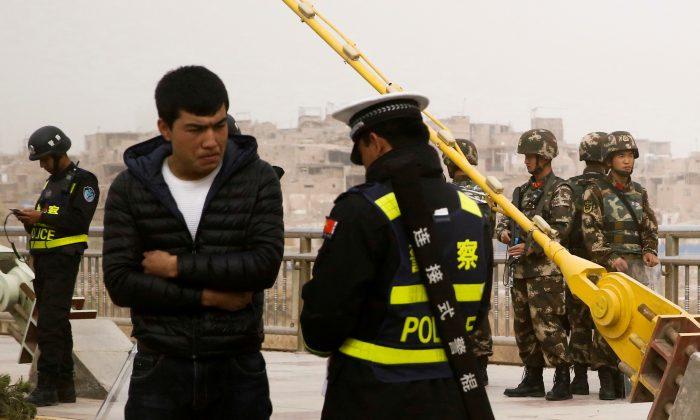WASHINGTON/BEIJING—U.S. lawmakers introduced legislation on Nov. 14 urging a stronger response by the Trump administration to China’s crackdown on minority Muslims, including possible sanctions against a senior official.
The legislation also asks President Donald Trump to condemn China’s actions in its western region of Xinjiang, call for a new “special coordinator” of U.S. policy on the issue, and seek consideration of a ban on export of U.S. technology that could be used by Beijing in the surveillance and mass detention of ethnic Uyghurs, according to a copy of the measure seen by Reuters.
Over the years, Xinjiang has been transformed into a vast security state, packed with police stations, street cameras, and security checkpoints at which electronic identity cards are scanned.
The lawmakers want the Trump administration to consider human rights-related sanctions against Xinjiang Party Secretary Chen Quanguo, who is also a member of the powerful Politburo, and other officials “credibly alleged to be responsible” for the security crackdown, the measure will say.
“Chinese government officials should be held accountable for their complicity in this evil and U.S. businesses should be barred from helping China create a high-tech police state in Xinjiang,” said U.S. Rep. Chris Smith (R-N.J.), one of the sponsors of the bipartisan legislation to be presented in both the Senate and House of Representatives.
Senior Aides More Vocal
Trump’s senior aides recently have become more vocal in their criticism of China’s treatment of its minority Muslims in Xinjiang, which has sparked an international outcry. Any sanctions, however, would be a rare move on human-rights grounds by the Trump administration against China, with which it is engaged in a bitter trade war.The Chinese regime has used the excuse of potential Islamic threats, “extremism” and ethnic riots to crack down on the local population in Xinjiang, and has urged the United States and other countries to stay out of its internal affairs.
Western countries including Canada, France, Germany, and the United States have urged China to shut down camps in Xinjiang, where activists say as many as 1 million members of the Uyghur minority and other Muslims are being detained.
Rubio said in a statement that some Chinese officials were responsible for “possible crimes against humanity.”
For several months, the Trump administration has been weighing sanctions against Chinese officials and companies operating in Xinjiang, U.S. officials have said, on condition of anonymity.
The new bill calls for consideration of measures under the Global Magnitsky Act, which hits rights violators with freezes on U.S. assets, U.S. travel bans, and prohibitions on Americans doing business with them, and also under a federal law to target those involved in religious repression around the world.
It will urge the administration to report back to Congress on Chinese companies involved in the camps and ask the FBI to act against any Chinese government efforts to intimidate Uyghurs living in the United States.





